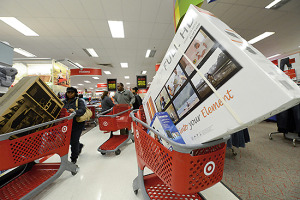Recently, I have been reading plenty of Facebook and Twitter posts from my friends in Korea talking about the upcoming Black Friday sales. This is an entirely new phenomenon; I have not seen such posts until very recently. As far as I remember, Koreans don’t celebrate American Thanksgiving and there is no such thing as ‘Black Friday’ in Korea. I was introduced to the concept only after I came to the United States. So I wondered how and where the excitement for Black Friday shopping was coming from and began to do my research.
Foreign imported goods are very common in South Korea. You can basically get anything you want as long as you’ve got cash in your hands. However, due to exclusive distribution rights held by only a limited number of retailers, many imported goods are often quite expensive comparing to its original price. In other words, many retail stores are able to charge rip-off costs to domestic consumers due to lack of competition.
As the world is getting smarter, so are the consumers. Now that consumers in Korea know how much the original price is for imported goods through searches online, overseas direct purchasing has become a new shopping trend. The word ‘블프’ pronounced as ‘Beulfe’, a contraction of two words Black Friday, is therefore a trending keyword among South Koreans as U.S.’ biggest retail sales action is coming up.
The Friday after Thanksgiving is no longer a holiday just for U.S. consumers since Koreans will be taking advantage of Black Friday deals by purchasing goods online through websites like Amazon and Best Buy.
“Guide” to purchasing goods on Amazon made by a Korean blogger.
Direct purchasing through online shopping has been trending since last year. Increasing number of cost-conscious consumers are turning their backs from domestic retailers that charge rip-off prices. Individual South Koreans last year spent more than $1 billion on goods from online retailers based outside Korea, a 47% increase from 2012. Among the direct purchases, three fourths of all shipments were good from the U.S.
To look for what Koreans are interested in the most for the coming Black Friday, I have been looking into several Korean blogs, websites and social media to look for trending deals. One interesting finding was that the most-discussed deal was in fact on sales on home appliances made by Samsung and LG Electronics.
Thus this coming Black Friday is not just about foreign goods but is also about getting good deals on Korean products as well. It looks like there will be a lot of reverse purchasing action taking place this time. It has been announced that Sears will be selling Samsung’s 55-inch full-HD TV for $599.9 while the exact same product gets sold for about $1,300 in the Korean market. Korean consumers who are angry at Samsung and LG for their notorious act of dumping have finally found a way to purchase good quality appliances at a much cheaper rate.
For retail business, overseas direct purchases is a nightmare. They have seen a steep decrease in their sales ever since Korean consumers have found smarter ways to get better deals through overseas purchases through the Internet.
On the other hand, shipping business is at its height. In order to process the increasing number of overseas direct purchases, delivery services in Korea have been making adjustments. Hyundai Logistics, one of Korea’s biggest shipping companies expects a 60% year-on-year increase in the number of overseas shipments during this holiday season. The company recently added new processing facilities in the U.S. just to process extra demands.
According to Bank of Korea, overseas direct purchasing so far only takes about 0.2~0.3% in the domestic market. Nonetheless, the current phenomenon would not stop and will be taking up more and more part unless domestic retail price goes down. As a consumer myself, I am more than happy to see the current phenomenon happening in South Korea. I cannot wait to see how the retail business in Korea will change to adapt to the current situation.


Leave a Reply
You must be logged in to post a comment.